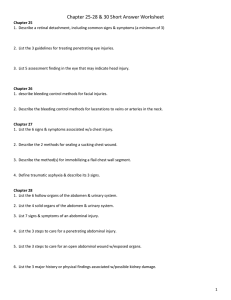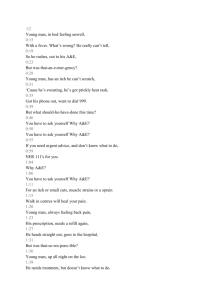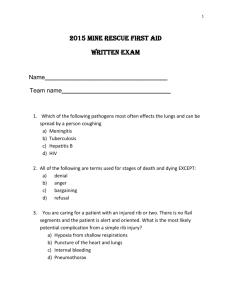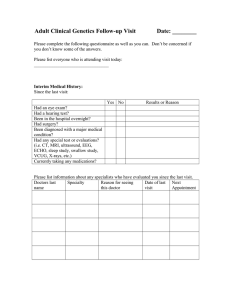First Aid Quiz: Test Your Knowledge
advertisement
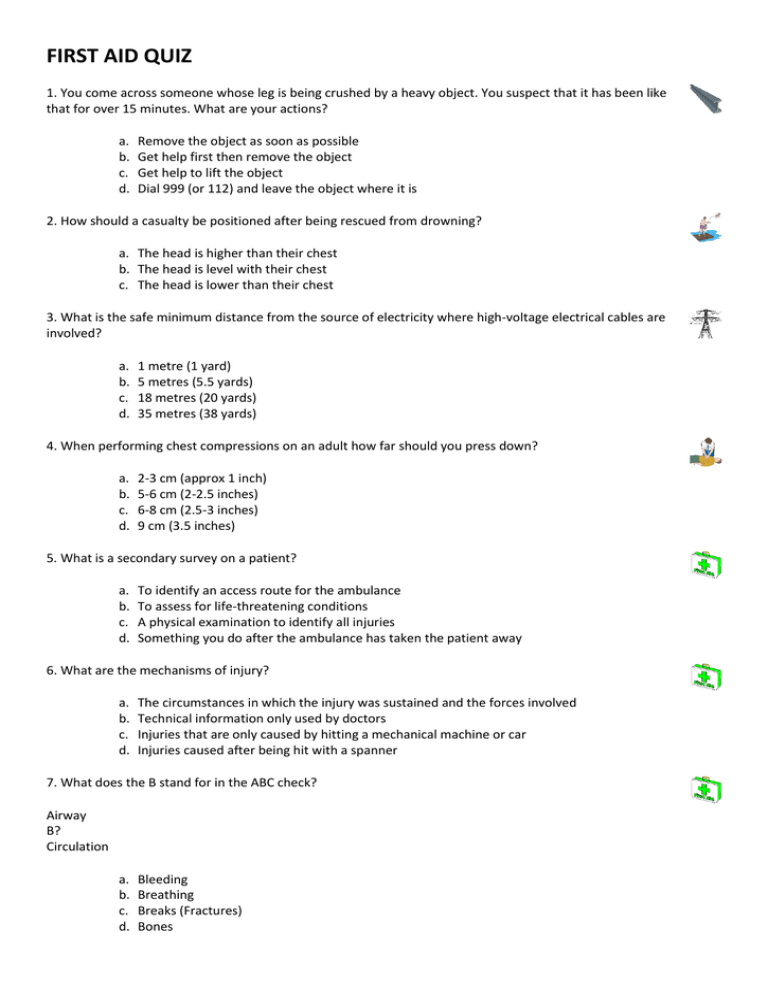
FIRST AID QUIZ 1. You come across someone whose leg is being crushed by a heavy object. You suspect that it has been like that for over 15 minutes. What are your actions? a. b. c. d. Remove the object as soon as possible Get help first then remove the object Get help to lift the object Dial 999 (or 112) and leave the object where it is 2. How should a casualty be positioned after being rescued from drowning? a. The head is higher than their chest b. The head is level with their chest c. The head is lower than their chest 3. What is the safe minimum distance from the source of electricity where high-voltage electrical cables are involved? a. b. c. d. 1 metre (1 yard) 5 metres (5.5 yards) 18 metres (20 yards) 35 metres (38 yards) 4. When performing chest compressions on an adult how far should you press down? a. b. c. d. 2-3 cm (approx 1 inch) 5-6 cm (2-2.5 inches) 6-8 cm (2.5-3 inches) 9 cm (3.5 inches) 5. What is a secondary survey on a patient? a. b. c. d. To identify an access route for the ambulance To assess for life-threatening conditions A physical examination to identify all injuries Something you do after the ambulance has taken the patient away 6. What are the mechanisms of injury? a. b. c. d. The circumstances in which the injury was sustained and the forces involved Technical information only used by doctors Injuries that are only caused by hitting a mechanical machine or car Injuries caused after being hit with a spanner 7. What does the B stand for in the ABC check? Airway B? Circulation a. b. c. d. Bleeding Breathing Breaks (Fractures) Bones 8. Under which of the following should a full face helmet be removed? Difficulty breathing Vomiting Whenever there are more than one first aider If suspect back injury 9. How should you check to see that the circulation has not been cut-off after applying a bandage to the wrist? a. Press a finger nail and see how quickly the colour returns b. Test the temperature of the finger with a thermometer c. See if they can still lift a heavy object 10. When arriving on the scene of an incident in what order are the priorities? a. Give emergency aid; Make the area safe; Get help from others; Assess the situation b. Get help from others; Give Emergency Aid; Assess the situation; Make the area Safe c. Assess the situation; Make the area safe; Give emergency aid; Get help from others 11. What is the normal colour for biohazard bags and sharps containers? ____________ 12.Which of the following would you use an elevation sling for? Bleeding hand Simple rib fracture Penetrating chest wound Fractured forearm 13. Which of the following can be used to remove a piece of grit from a wound (select all that apply)? Tweezers Wet cotton wool Cold water Paper towel Never remove any foreign object 14. If hypothermia occurs from someone being outside for a long length of time how should they be reheated? a. Rapidly (e.g. bath warm water) b. Slowly (e.g. with blankets) 15. What is a warning bracelet for? a. Warn others that the patient may have a contagious disease b. Give important information about the medical history of the patient c. Provide generic information on first aid for many illnesses 16. With a patient suffering from a penetrating chest wound should you lean the patient towards the injured side or away from it? a. Towards the injured side b. Away from the injured side 17. If someone has taken an overdose of drugs, should you induce vomiting? a. Yes b. No 18. Someone has suffered an electric shock from a power tool. You are unable to isolate the electricity at the mains, which of the following should be used to move the power tool away? a. b. c. d. Your bare foot A metal object (e.g. piping) A wet piece of wood A dry broom handle 19. Which of your senses is not normally used when assessing a casualty? a. b. c. d. e. Sight Hearing Touch Smell Taste 20. What is the priority when treating any casualty? a. b. c. d. Bleeding Circulation Fractures Airway 21. Which two of the following should you do for a bruise? Raise the injured part Keep the injured part below the height of the chest Apply a cold compress Use a hair drier to warm the injury 22. If an asthma sufferer takes their medication, but it has no effect, how long should you wait before dialing 999 (or 112) for an ambulance? a. b. c. d. Always call 999 (or 112) for an asthma attack After 30 seconds After a few minutes After 30 minutes 23. What should be done for a firmly embedded foreign object in a wound? a. Remove as soon as possible b. Leave in place and seek further medical attention c. Remove after 10 minutes 24. What type of injury is a cut from broken glass likely to inflict? a. b. c. d. e. Laceration Incised Abrasion Contusion Puncture 25. What position should someone with an abdominal wound be placed in? a. b. c. d. Lying flat on back Lying down with knees raised Sitting on a chair Standing
